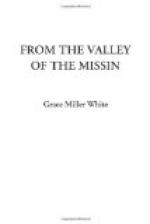* * * * *
The once happy household of the Shellingtons had turned into a gloomy abode. Ann was nonplused at the strange behavior of her brother and the unusual reserve of Flea. Floyd from his bedroom endeavored to bring the home to its former cheerfulness; but, with all Ann’s energies and the boy’s tireless tact, the change did not come. At length Miss Shellington gave up trying to bring things to their usual routine. She spent her day hours in helping Fledra with her school studies and giving Floyd simple lessons at home. Everett came every evening, taking Ann from the sickroom. This left Fledra free to study quietly beside her brother.
One Thursday, after dinner, Horace went by invitation to Brimbecomb’s home to play billiards. Of late the young men had not passed much of their time together; for business and the presence of Fledra and Floyd in his house had given Horace less time for recreation. After a silent game they sat down to smoke. For many minutes they puffed without speaking. Everett finally opened the conversation.
“It seems more like old times to be here together again.”
“Yes, I’ve missed our bouts, Everett.”
“You’ve been exasperatingly conservative with your time lately!” complained Everett. “A fellow can’t get sight of you unless your nose is poked in a book or you’re in court!”
Horace laughed.
“Really, I’ve been awfully busy since—”
“Since the coming of your wonderful charges!” finished Brimbecomb.
Horace scented a sneer. His ears grew hot with anger.
“Ann has done more than I,” he explained; “although there is nothing I would not do.”
“I can’t understand it at all, old man! Pardon me if I seem dense, but it’s almost an unheard-of thing for a fellow in your and Ann’s positions to fill your home with—beggars.” His voice was low, with an inquiring touch in it. Having gained no satisfaction from Miss Shellington, he was seeking information from Horace.
“We don’t think of either one of them as beggars,” interjected Horace. “Both Ann and I have grown very fond of them.”
In former days the two young men had been on terms of intimacy. Everett presumed now upon that friendship by speaking plainly:
“Are you going to keep them much longer?” he asked.
Horace allowed his lids to droop slowly, and looked meditatively at the end of his cigarette without replying.
“I have a reason for asking,” Everett added.
“And may I ask your reason?”
“Yes, I suppose so. The fact is, I’m rather interested in them myself. I thought—”
Horace lifted his eyes, and the man opposite noted that they had grown darker, that they sparkled angrily. Everett was desirous of satisfying himself whether Horace did, or did not, care for the young girl he was sheltering.
“They don’t need your interest so far as a home is concerned,” Horace said at last.




